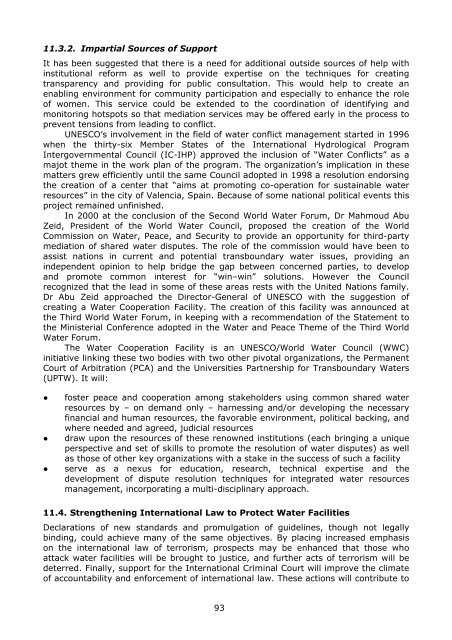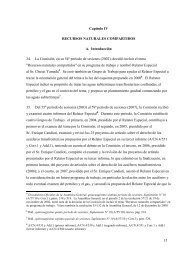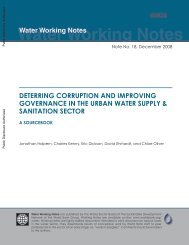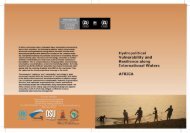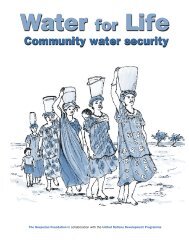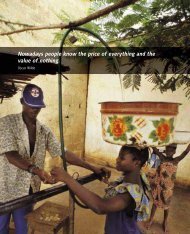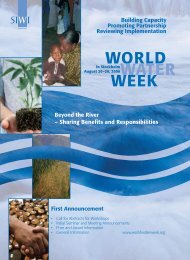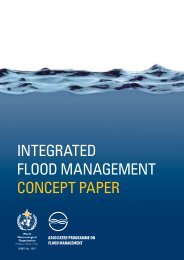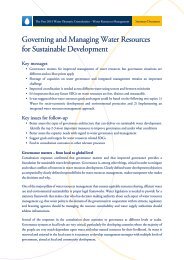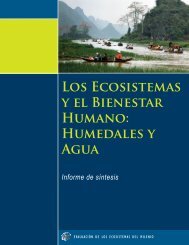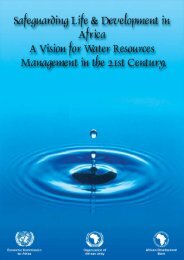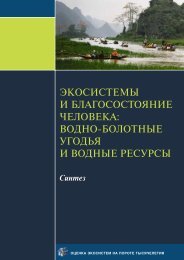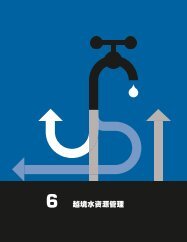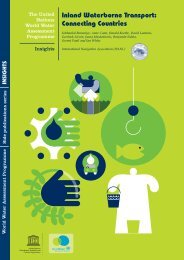Water security and peace: a synthesis of studies ... - unesdoc - Unesco
Water security and peace: a synthesis of studies ... - unesdoc - Unesco
Water security and peace: a synthesis of studies ... - unesdoc - Unesco
You also want an ePaper? Increase the reach of your titles
YUMPU automatically turns print PDFs into web optimized ePapers that Google loves.
11.3.2. Impartial Sources <strong>of</strong> Support<br />
It has been suggested that there is a need for additional outside sources <strong>of</strong> help with<br />
institutional reform as well to provide expertise on the techniques for creating<br />
transparency <strong>and</strong> providing for public consultation. This would help to create an<br />
enabling environment for community participation <strong>and</strong> especially to enhance the role<br />
<strong>of</strong> women. This service could be extended to the coordination <strong>of</strong> identifying <strong>and</strong><br />
monitoring hotspots so that mediation services may be <strong>of</strong>fered early in the process to<br />
prevent tensions from leading to conflict.<br />
UNESCO’s involvement in the field <strong>of</strong> water conflict management started in 1996<br />
when the thirty-six Member States <strong>of</strong> the International Hydrological Program<br />
Intergovernmental Council (IC-IHP) approved the inclusion <strong>of</strong> “<strong>Water</strong> Conflicts” as a<br />
majot theme in the work plan <strong>of</strong> the program. The organization’s implication in these<br />
matters grew efficiently until the same Council adopted in 1998 a resolution endorsing<br />
the creation <strong>of</strong> a center that “aims at promoting co-operation for sustainable water<br />
resources” in the city <strong>of</strong> Valencia, Spain. Because <strong>of</strong> some national political events this<br />
project remained unfinished.<br />
In 2000 at the conclusion <strong>of</strong> the Second World <strong>Water</strong> Forum, Dr Mahmoud Abu<br />
Zeid, President <strong>of</strong> the World <strong>Water</strong> Council, proposed the creation <strong>of</strong> the World<br />
Commission on <strong>Water</strong>, Peace, <strong>and</strong> Security to provide an opportunity for third-party<br />
mediation <strong>of</strong> shared water disputes. The role <strong>of</strong> the commission would have been to<br />
assist nations in current <strong>and</strong> potential transboundary water issues, providing an<br />
independent opinion to help bridge the gap between concerned parties, to develop<br />
<strong>and</strong> promote common interest for “win–win” solutions. However the Council<br />
recognized that the lead in some <strong>of</strong> these areas rests with the United Nations family.<br />
Dr Abu Zeid approached the Director-General <strong>of</strong> UNESCO with the suggestion <strong>of</strong><br />
creating a <strong>Water</strong> Cooperation Facility. The creation <strong>of</strong> this facility was announced at<br />
the Third World <strong>Water</strong> Forum, in keeping with a recommendation <strong>of</strong> the Statement to<br />
the Ministerial Conference adopted in the <strong>Water</strong> <strong>and</strong> Peace Theme <strong>of</strong> the Third World<br />
<strong>Water</strong> Forum.<br />
The <strong>Water</strong> Cooperation Facility is an UNESCO/World <strong>Water</strong> Council (WWC)<br />
initiative linking these two bodies with two other pivotal organizations, the Permanent<br />
Court <strong>of</strong> Arbitration (PCA) <strong>and</strong> the Universities Partnership for Transboundary <strong>Water</strong>s<br />
(UPTW). It will:<br />
! foster <strong>peace</strong> <strong>and</strong> cooperation among stakeholders using common shared water<br />
resources by – on dem<strong>and</strong> only – harnessing <strong>and</strong>/or developing the necessary<br />
financial <strong>and</strong> human resources, the favorable environment, political backing, <strong>and</strong><br />
where needed <strong>and</strong> agreed, judicial resources<br />
! draw upon the resources <strong>of</strong> these renowned institutions (each bringing a unique<br />
perspective <strong>and</strong> set <strong>of</strong> skills to promote the resolution <strong>of</strong> water disputes) as well<br />
as those <strong>of</strong> other key organizations with a stake in the success <strong>of</strong> such a facility<br />
! serve as a nexus for education, research, technical expertise <strong>and</strong> the<br />
development <strong>of</strong> dispute resolution techniques for integrated water resources<br />
management, incorporating a multi-disciplinary approach.<br />
11.4. Strengthening International Law to Protect <strong>Water</strong> Facilities<br />
Declarations <strong>of</strong> new st<strong>and</strong>ards <strong>and</strong> promulgation <strong>of</strong> guidelines, though not legally<br />
binding, could achieve many <strong>of</strong> the same objectives. By placing increased emphasis<br />
on the international law <strong>of</strong> terrorism, prospects may be enhanced that those who<br />
attack water facilities will be brought to justice, <strong>and</strong> further acts <strong>of</strong> terrorism will be<br />
deterred. Finally, support for the International Criminal Court will improve the climate<br />
<strong>of</strong> accountability <strong>and</strong> enforcement <strong>of</strong> international law. These actions will contribute to<br />
93


